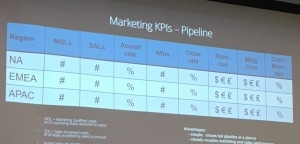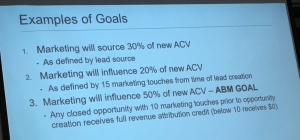Marketing matters, and metrics are integral to its influence. On Tuesday, January 24th, two highly experienced marketing leaders shared their wisdom with an appreciative crowd of AMA Boston members and guests at the “Actionable Marketing Metrics: Tools and Methodologies” event at Boston’s Non-Profit Center. Bedrock Data’ CEO Thor Johnson and ServiceChannel CMO Kristin Hambelton balanced the strategic importance of measurement with practical tips to improve a company’s results.
 The evening started with recognition of winners of two AMA Boston awards. President Nirmal Parikh presented the Volunteer of the Quarter to marketer deluxe and social media stalwart Bob Cargill, and the new Blogger of the Quarter to the highly-respected marketer Michelle Heath, then shared the calendar of exciting events for the rest of Q1. Then it was on to the main show.
The evening started with recognition of winners of two AMA Boston awards. President Nirmal Parikh presented the Volunteer of the Quarter to marketer deluxe and social media stalwart Bob Cargill, and the new Blogger of the Quarter to the highly-respected marketer Michelle Heath, then shared the calendar of exciting events for the rest of Q1. Then it was on to the main show.
Thor Johnson, Bedrock
 Thor’s guidance of this leader in connecting SaaS systems within a company, has helped him see the broader role of marketing. How do you make sure marketing prospers? It’s essential to market marketing within your own company, and you need to create a plan and communicate it widely, including to the Board and senior management. And – always back it up with metrics. Some of the other key take-aways from Thor’s presentation:
Thor’s guidance of this leader in connecting SaaS systems within a company, has helped him see the broader role of marketing. How do you make sure marketing prospers? It’s essential to market marketing within your own company, and you need to create a plan and communicate it widely, including to the Board and senior management. And – always back it up with metrics. Some of the other key take-aways from Thor’s presentation:
- Focus on growth and revenue; a critical role for marketing is to “point the company at the right customers.”
- The “ground rules” include consistent cadence and honesty in communications, a focus on results versus activity, and a bias to action.
- Measurement helps address three key factors:
- Impact: do your marketing efforts work, how do you know, and can you show others it’s working.
- Velocity: how fast does marketing work; can you speed up the sales cycle; is faster better.
- Cost: Is marketing economical, and compared to what? How honestly are you measuring costs?
- Own all aspects the pipeline. It’s critical that sales and marketing be aligned on your reporting data, and required to gain buy-in from the Board.
 Marketing KPIs for the pipeline must connect marketing and sales, and include the qualified leads marketing produces, how many sales accepts, how many turn into revenue, the loaded marketing cost, and ROI.
Marketing KPIs for the pipeline must connect marketing and sales, and include the qualified leads marketing produces, how many sales accepts, how many turn into revenue, the loaded marketing cost, and ROI.- Some of Thor’s key learnings included the importance of process, demand gen, a good relationship with the CFO, sales results, and publication of marketing activity.
- In closing, Thor provided practical How To’s such as starting with Excel, developing a small set of monthly metrics, getting support from your CFO, using an intern to handle small details, publicizing marketing’s story frequently, and being accountable for both positive and negative changes.
Kristin Hambelton, ServiceChannel
 Kristin’s experience with this fast-growth facility maintenance management software company helped her complement Thor’s presentation, as she provided an intensive look at how to define and report on key marketing metrics. Take-aways for the audience included:
Kristin’s experience with this fast-growth facility maintenance management software company helped her complement Thor’s presentation, as she provided an intensive look at how to define and report on key marketing metrics. Take-aways for the audience included:
- What are marketing metrics? Goals and Key Performance Indicators (KPIs) – you are measured on goals and use KPIs to track the health of your marketing.
- No one size fits all; strategies, business challenges, demand generation approaches (e.g. waterfall vs account based) all vary by company.
- In B2B, it’s crucial to understand how and when sales makes money so you can speak their language.
- There are two critical steps in the process:
- Defining goals and reporting, based on what marketing is accountable for:
- Work not just with your management team but also with all related functions to define quantifiable goals, closely tied to revenue.
 Publish, circulate and socialize these goals, and after they’re finalized, share with all your stakeholders.
Publish, circulate and socialize these goals, and after they’re finalized, share with all your stakeholders.- Report consistently with a defined frequency, stick to it, be transparent, and align with sales teams.
- Several examples of goals provided for the attendees; give snapshot with link to full document if they want details – don’t overshare.
- Defining KPI’s and reporting to track marketing activities
- KPIs are more comprehensive than goals, shows regular progress toward goals, combine financial and activity-based goals, indicate if other functions aren’t aligned, and help update budgets.
- KPIs vary by business and can change – only track what’s clear and reasonably measurable.
- As with goals, you will want to get input and buy-in from management and supporting functions – and don’t forget your own team, which must perform the actual tracking and reporting.
- On reporting, don’t email a huge deck of information, but make it a privilege to receive your info and make people earn it through participation in verbal walk-through
AMA Boston would like to thank our speakers and the engaged audience for creating another interesting and informative event! We look forward to seeing you soon – please browse our coming events and watch for new live events and webinars that will soon be added.

